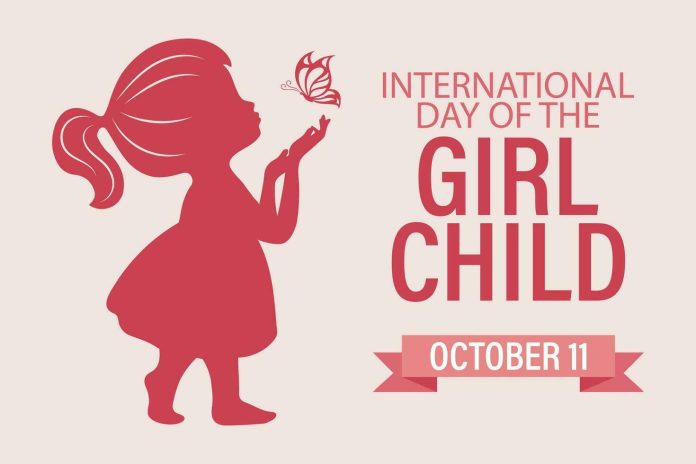
By Brig Syed Karrar Hussain Retired
Introduction
Every year, the International Day of the Girl Child is observed across the world on 11th October under the guidance of the United Nations. This day reminds the global community of its moral and social responsibility to recognize, respect, and promote the rights of girls. It calls for action to end gender-based discrimination, ensure access to education, protect from violence and exploitation, and provide opportunities for girls to live a life of dignity, safety, and empowerment.
The United Nations first declared this day in 2011, acknowledging that millions of girls across the globe continue to face challenges such as early marriages, illiteracy, child labor, gender-based violence, and lack of healthcare. The purpose is not only to highlight these issues but also to motivate governments, parents, and civil societies to take concrete steps toward building a gender-equal society where every girl can realize her full potential.
Purpose of the International Day of the Girl Child
The primary purpose of this day is to draw attention to the challenges that girls face globally and to promote their rights to education, health, and equality. The UN theme each year focuses on key areas such as technology inclusion, leadership, health, and education. The ultimate aim is to empower girls as agents of change who can contribute to building a peaceful, just, and progressive world.
For centuries, in many societies, the birth of a girl was not celebrated; rather, it was seen as a burden. The 21st century demands a change in that mindset. The world now recognizes that empowering girls means empowering families, communities, and nations. Educated girls become responsible mothers, skilled professionals, and strong contributors to national development. Thus, this day is not only symbolic—it is a call to action for every individual and institution.
Islamic Teachings about the Dignity and Rights of Girls
Long before modern movements for women’s rights, Islam had already established the dignity, respect, and equality of girls. The Holy Prophet Muhammad (Peace Be Upon Him) ended the cruel custom of burying newborn daughters alive and declared daughters as a source of blessings and mercy. He (PBUH) said, “Whoever brings up two daughters with love and kindness until they grow up, he and I will be together in Paradise like this,” and he joined two fingers together to show closeness.
Islam clearly states that both sons and daughters are equal in the sight of Allah, and both are entitled to education, inheritance, and respect. The Holy Qur’an emphasizes justice, kindness, and fair treatment towards daughters. Parents are instructed to celebrate their daughters as a divine gift and provide them with proper upbringing, love, and knowledge.
In Islamic history, the daughters of the Holy Prophet (PBUH), especially Hazrat Fatima Zahra (R.A.), stand as eternal examples of dignity, purity, and spiritual excellence. These teachings make it clear that empowering and educating girls is not a Western idea—it is an Islamic obligation and a moral duty for every Muslim family and society.
Issues Faced by Girls Around the World
Despite remarkable progress in legislation and education, girls in developing countries continue to suffer from multiple forms of discrimination. The issues they face are diverse, interconnected, and often rooted in cultural, social, and economic systems.
1. Gender Discrimination and Inequality
In many parts of the world, girls are treated as inferior to boys. They face restrictions in education, freedom of choice, and even healthcare. The preference for sons in certain societies leads to neglect of daughters from birth.
2. Lack of Access to Quality Education
Millions of girls are denied basic education due to poverty, early marriages, or social taboos. According to UNICEF, more than 120 million girls globally are out of school. Education remains the most powerful weapon against poverty and inequality, yet it is still out of reach for many girls.
3. Early and Forced Marriages
Child marriage remains one of the gravest human rights violations. Every year, approximately 12 million girls are married before the age of 18. Early marriage not only deprives them of education but also exposes them to health risks, domestic violence, and lifelong trauma.
4. Violence and Harassment
Girls are often subjected to harassment, domestic violence, and sexual abuse—both in physical and online spaces. Many cases go unreported due to fear, social stigma, or lack of legal protection. This erodes their confidence and emotional well-being.
5. Child Labor and Exploitation
In many poor regions, girls are forced into child labor, domestic work, or even trafficking. Instead of classrooms, they spend their childhood serving others or struggling for survival. This exploitation robs them of a fair chance to build a better life.
6. Lack of Healthcare and Nutrition
Girls in low-income families often suffer from malnutrition and limited access to healthcare. The cultural bias that prioritizes boys in food and medicine distribution leads to stunted growth and preventable diseases among girls.
7. Digital and Technological Exclusion
As the world advances toward digital transformation, girls in developing countries are being left behind. Limited access to the internet, digital devices, and IT education keeps them from exploring new opportunities for learning and employment.
Guidelines for Parents
Parents play the most crucial role in shaping the destiny of their daughters. It is within the home that a girl first learns her value, rights, and identity. Therefore, parents must realize that their behavior, choices, and guidance can determine whether their daughters grow up confident or suppressed.
1. Value Daughters as Equal to Sons
Parents should reject all social taboos that consider girls inferior. They should celebrate the birth of daughters with the same happiness as sons and give them equal access to love, respect, and resources.
2. Provide Quality Education
Education is the foundation of empowerment. Parents must ensure that their daughters receive quality education and encouragement to pursue higher studies. Educated girls can make informed decisions, break cycles of poverty, and contribute meaningfully to society.
3. Build Confidence and Self-Esteem
Parents must nurture their daughters’ confidence from an early age. Teach them to believe in themselves, speak with courage, and face challenges with dignity. Encourage them to participate in debates, sports, and leadership activities.
4. Ensure Safety and Emotional Support
A secure home environment is essential for a girl’s mental and emotional growth. Parents should teach their daughters about personal safety, self-defense, and the importance of reporting any inappropriate behavior. Open communication between parents and children prevents exploitation and builds trust.
5. Avoid Early Marriages
Parents should never force their daughters into early or unwanted marriages. Marriage should only take place when a girl is mature, educated, and willing. Early marriages destroy dreams and often lead to lifelong suffering.
6. Teach Moral and Religious Values
Moral and religious teachings help girls develop a strong character and resilience against social pressures. A girl grounded in faith, ethics, and compassion will always make responsible choices.
7. Encourage Career and Skill Development
Parents should support their daughters in choosing professions of their interest—whether in science, technology, arts, or public service. Skill development programs and vocational training can prepare girls for financial independence.
Guidelines for the Government of Pakistan
Pakistan, as a developing country, has made progress in girls’ education and empowerment, yet challenges remain. To ensure that every girl enjoys her rights, the government must adopt comprehensive, sustained, and inclusive policies.
1. Strengthen Educational Reforms
The government must ensure that every girl has access to free and compulsory education up to matriculation. Special emphasis should be placed on rural areas, where dropout rates remain high due to poverty, distance, and lack of schools. Scholarship programs, female teachers, and safe transportation facilities can encourage families to send their daughters to school.
2. Legislation and Implementation Against Early Marriages
While child marriage laws exist, enforcement is weak. Strict monitoring, awareness campaigns, and community-based reporting systems should be developed to eliminate early and forced marriages.
3. Women’s Health and Nutrition Programs
Health facilities specifically designed for girls and women must be expanded, especially in rural and underdeveloped regions. Awareness about hygiene, maternal health, and nutrition should be part of the national curriculum.
4. Protection Against Harassment and Violence
The government must ensure the effective implementation of existing laws on harassment, abuse, and domestic violence. Women police stations, legal aid centers, and helplines should be strengthened and made accessible in every district.
5. Economic Empowerment and Skill Training
Vocational training centers for girls should be established in every tehsil and district. Programs in information technology, healthcare, and entrepreneurship can prepare girls for financial independence and professional success.
6. Promote Digital Literacy
In the digital age, girls must not be left behind. Initiatives like “Digital Pakistan for Girls” can provide internet access, laptops, and training in coding, online business, and digital safety.
7. Representation and Leadership Opportunities
The government should create equal opportunities for girls in politics, administration, and civil services. Mentorship programs and youth councils can help prepare young women for leadership roles in the country’s development.
8. Collaboration with Civil Society and Media
Partnerships with NGOs, media, and religious scholars can help spread awareness about girls’ rights and the importance of gender equality. Positive media portrayal of women role models can change social attitudes.
Conclusion
The International Day of the Girl Child reminds us that the true strength of a nation lies in how it treats its daughters. When girls are educated, respected, and protected, nations rise in knowledge, prosperity, and moral strength. Islam teaches us that daughters are a blessing from Allah, and raising them with love and care is an act of worship.
Pakistan, with its deep moral and Islamic foundations, must continue to promote a society where girls are not suppressed but celebrated as future mothers, leaders, and builders of the nation. Parents, teachers, and the government together hold the responsibility to ensure that no girl is denied her rights due to poverty, ignorance, or discrimination. Let us pledge that every girl child in Pakistan will be nurtured with education, dignity, and love—so she may stand tall as a proud daughter of this great nation.

























